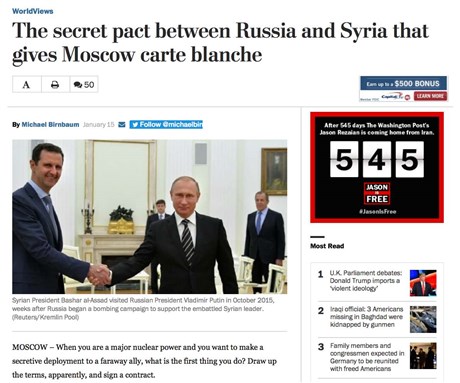[The following is an English translation made available by the Washington Post on 15 January 2016 of a Russian-language document the newspaper claims was posted on a Russian government website. According to the Washington Post, the document "details the terms of its [Russian] ariel support for Syrian President Bashar al-Assad."]
Agreement between the Russian Federation and the Syrian Arab Republic on deployment of an aviation group of the Russian Armed Forces on the territory of the Syrian Arab Republic.
The Russian Federation and the Syrian Arab Republic, further on referred to as “parties to the agreement,” based on the provisions of the Treaty of Friendship between the Union of Soviet Socialist Republics and the Syrian Arab Republic from October 8, 1980, as well as agreements signed between the Ministry of Defense of the Russian Federation and the Ministry of Defense of the Syrian Arab Republic on July 7, 1994, and in accordance with the mutual aspiration to protect the sovereignty, territorial integrity and security of the Russian Federation and Syrian Arab Republic;
Recognizing that the deployment of Russian aviation group on the territory of the Syrian Arab Republic is aimed at maintaining peace and stability in the region. Its purpose is purely defensive, and is not directed against any other state;
Confirming the commonness of tasks of fighting against terrorism and extremism;
Realizing the necessity of consolidating efforts in counteraction to terrorist threats;
Agreed on the following:
Article 1
Terms of the Agreement
Article 2
Subject of the Agreement
- Upon the request of the Syrian side, the Russian Federation is deploying a Russian aviation group on the territory of the Syrian Arab Republic.
- Place of deployment of the Russian aviation group and the list of facilities transferred over to the Russian side are stipulated in a separate protocol to the present agreement.
- For the deployment of the Russian aviation group, the Syrian side provides Hmeimim airbase in Latakia province, with its infrastructure, as well as the required territory agreed upon between the parties.
- Hmeimim airbase and its infrastructure are provided for use by the Russian Federation without charge.
- The engagement of the Russian aviation group shall be carried out upon the decision of the commander of the group and in accordance with the plans agreed upon between the parties.
Article 3
Authorized Agencies
Article 4
Composition of the Russian Aviation group
- Composition (type and quantity of air equipment, ammunitions and military equipment as well as size of personnel) of the Russian aviation group shall be defined by the Russian side upon the agreement with the Syrian side.
- The organizational chart and list of staff of the Russian aviation group shall be developed, approved and amended by the authorized agency of the Russian party, notifying the authorized agency of the Syrian party.
Article 5
Importing and exporting of property and travel of personnel
- The Russian party shall have the right to move into the Syrian Arab Republic and move out from the Syrian Arab Republic any equipment, ammunition, shells and other materials required for the aviation group, without any fees or duties.
- All movable property and objects of infrastructure temporarily deployed by the Russian party on Hmeimim airbase shall remain the property of the Russian Federation.
- Personnel of the Russian aviation group shall be able to freely cross the border, upon presenting travel documents valid for exit from Russia, and shall not be subject for customs or border control.
Article 6
Immunity and privileges
- The Russian servicemen shall respect the laws, customs and traditions of the country of sojourn, of which they will be informed upon their arrival in Syria.
- The Russian military contingent shall be immune from Syria’s civilian and administrative jurisdiction.
- Movables and immovables of the Russian aviation group shall be inviolable. Representatives of the Syrian Arab Republic shall not have the right to enter the place of deployment without prior agreement with the commander.
- The servicemen and their families enjoy all the privileges under the 1961 Vienna Convention on Diplomatic Relations.
- Any property belonging to the Russian aviation group has been declared immune and inviolable.
Syria has also pledged to exempt the Russian air group from any direct and indirect taxes.
Article 7
Settlement of claims
- The Syrian Arab Republic shall not lodge claims to the Russian Federation, the Russian aviation group and its personnel, and shall not file any suits related to the activity of the Russian aviation group and its personnel.
- The Syrian Arab Republic assumes responsibility for settling all claims that could be put forward by third parties as a result of damage caused by the activities of the Russian air group and its personnel.
Article 8
Tax benefits
The Syrian Arab republic exempts the Russian aviation group from any direct and indirect taxes.
Article 9
Amendments to the Agreement
Upon agreement between the parties the present agreement can be amended. The amendments shall be stipulated in separate protocols.
Article 10
Settlement of disagreements
All disagreements arising from using or interpreting of the present agreement shall be settled through consultations.
Article 11
Effective Date
The agreement is temporarily used from the date of its signing and enters into force as of the date of notification via diplomatic channels of fulfillment of the parties’ internal procedures.
Article 12
Term of the Agreement and its Termination
This agreement is for an indefinite period. It can be terminated by any of the signatories upon written notification. In this case, the agreement loses validity a year after the notification has been received by the other side.
The agreement was signed in Damascus on August 26, 2015, in Russian and Arabic, with both texts being equally authentic.
[signatures]


















